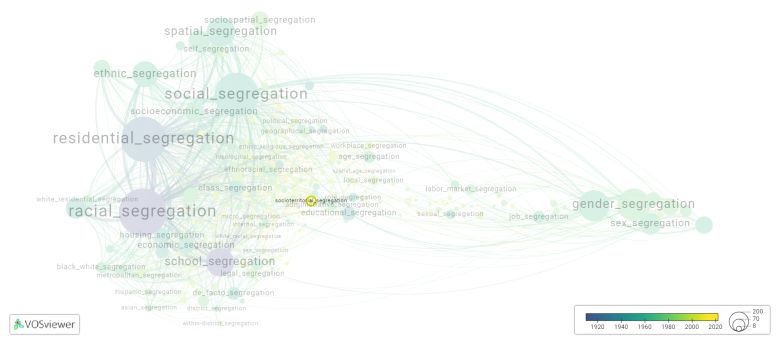Socioterritorial segregation
Date and country of first publication[1][edit | edit source]
2016
United States
Definition[edit | edit source]
Socio-territorial segregation refers to the unequal spatial distribution of socio-economic groups within a certain geographical area. This can take many forms, such as segregated neighborhoods, cities, or regions based on income level, race, ethnicity, or other social factors.
Socio-territorial segregation can have a number of negative impacts, including reinforcing social inequalities, limiting access to resources and opportunities for marginalized groups, and perpetuating stereotypes and biases. It can also lead to social isolation, discrimination, and unequal access to education, healthcare, and other important services.
Addressing socio-territorial segregation often requires a multi-faceted approach that includes policies aimed at promoting social inclusion, reducing inequalities, and creating more inclusive and equitable communities. This may involve implementing affordable housing policies, investing in infrastructure and services in marginalized areas, promoting diversity and integration, and challenging discriminatory practices and attitudes. By addressing the root causes of socio-territorial segregation, we can create more just and inclusive societies that benefit all members of the community.
Synonyms[edit | edit source]
The following terms are synonymous with socioterritorial segregation:
socio territorial segregation.
References and literature addressing this segregation form under these synonymous terms can be found below.
See also[edit | edit source]
Related segregation forms[edit | edit source]
Socioterritorial segregation is frequently discussed in the literature with the following segregation forms:
social segregation, educational segregation, school segregation

This visualization is based on the study The Multidisciplinary Landscape of Segregation Research.
For the complete network of interrelated segregation forms, please refer to:
References[edit | edit source]
Notes[edit | edit source]
- ↑ Date and country of first publication as informed by the Scopus database (December 2023).
At its current state, this definition has been generated by a Large Language Model (LLM) so far without review by an independent researcher or a member of the curating team of segregation experts that keep the Segregation Wiki online. While we strive for accuracy, we cannot guarantee its reliability, completeness and timeliness. Please use this content with caution and verify information as needed. Also, feel free to improve on the definition as you see fit, including the use of references and other informational resources. We value your input in enhancing the quality and accuracy of the definitions of segregation forms collectively offered in the Segregation Wiki ©.
Socioterritorial segregation appears in the following literature[edit | edit source]
Stillerman J. (2016). Educating middle class children in Santiago: Cultural capital and socio territorial segregation in the formation of local education markets; [Educar a niñas y niños de clase media en Santiago: Capital cultural y segregación socioterritorial en la formación de mercados locales de educación]. Eure, 42(126), 169-186. Revista de Geografia Norte Grande.https://doi.org/10.4067/S0250-71612016000200008
Link F., Méndez M.L., Ibarra M., Ruiz-Tagle J., Matus C. (2021). THE CRISIS AND SPATIALITY OF CARE IN A PANDEMIC: Housing and Neighborhoods in Santiago de Chile; [Crisis y espacialidad de los cuidados en pandemia: Vivienda y barrio en Santiago de Chile]. ARQ, 2021(109), 86-97. Pontificia Universidad Catolica de Chile 1.https://doi.org/10.4067/S0717-69962021000300086
